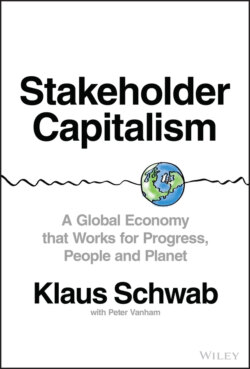Читать книгу Stakeholder Capitalism - Klaus Schwab - Страница 15
Globalization in the 1990s and 2000s
ОглавлениеIndeed, following the Soviet Union's collapse, for more than a decade the world's economies became more intertwined. Countries all over the world started to set up free-trade agreements, and the motors of global growth were more varied than ever. The relative importance of Europe declined, and so-called emerging markets, such as South Korea and Singapore but also larger ones such as Brazil, Russia, India, South Africa, and, of course, China, came to the forefront. (There is no formal definition of emerging markets, as it's a classification made by particular private financial institutions, but one common trait that they share is that they are non-Western economies that often have or had higher-than-average growth rates for a number of years, which could help them gain or regain developed-economy status over time.)
In this way, globalization—a process of growing interdependence between the world's economies, signaled by increasing flows of goods, services, people, and capital—became a dominant economic force. Trade globalization, measured by international trade as a percentage of global GDP, reached its highest level ever—15 percent—in 2001, up from 4 percent at its nadir in the Year Zero of 1945.
Swabia's prominent companies surfed this wave of globalization, too. “China was at the top of ZF's agenda,” Siegfried Goll, then a prominent ZF manager, testified in the company's written history.22 “The development of our business relations began already in the 1980s, initially by means of license contracts. When I retired in 2006, we had no fewer than 20 production locations in China.” According to the company's own records, “The first joint venture was established in 1993,” and by 1998, “ZF's position in China was so firmly entrenched that the first-ever founding of a fully owned Chinese subsidiary was possible: ZF Drivetech Co. Ltd. in Suzhou.”
For some, though, this globalization was too much, too quickly. In 1997, several Asian emerging economies experienced a severe financial crisis, caused in large part by unchecked financial globalization, or the flow of hot money, international investor money that flows easily from one country to another, chasing returns, relaxed capital controls, and bond speculation. At the same time, in the West, an anti-globalization movement took hold, as multinational companies started to have more control over national economies.
Even Ravensburger didn't escape the backlash. In 1997, the company management announced that it wished to “introduce a ‘pact for the safeguarding of production sites,’ as a ‘preventive initiative for the maintenance of national and international competitiveness,’” the European Observatory of Working Life wrote in a later case study on the mater.23 The result was the so-called Ravensburger Pact, in which the company offered its employees job security in exchange for concessions.
Although the pact was accepted by most workers, it also led to a deterioration in employee-employer relations. The industry union argued it went against collective bargaining agreements for the sector and that it was unnecessary, as the company had good economic performance. In the end, the hotly contested pact made all parties reconsider their relationship to each other. The union, which had typically been weak in the family-owned enterprise, grew stronger, and management took on a more constructive approach to its Works Council going forward.
In Germany, similar societal and corporate stresses around economic growth, employment, and the integration of the former East German states ultimately led to a new social pact in the early 2000s, with new laws on co-determination, “mini jobs,” and unemployment benefits. But the new equilibrium was for some less beneficial than before, and even though Germany afterward returned to a period of high economic growth, the situation soon got more precarious for many other advanced economies.
A first warning sign came from the dot-com crash in late 2000 and early 2001, when America's technology stocks came crashing down. But the greater shock to US society and the international economic system came later in 2001. In September of that year, the US faced the greatest attack on its soil since the attack on Pearl Harbor in World War II: the 9/11 terrorist attacks. Buildings representing both the economic and the military hearts of America were hit: the Twin Towers in Manhattan and the Pentagon in Washington, DC.
I was in New York that day on a work visit to the UN, and like everyone there, I was devastated. Thousands of people died. The United States came to a standstill. As a sign of solidarity, the following January we organized our Annual Meeting of the World Economic Forum in New York—the first it was held outside Davos. After the dot-com crash and 9/11, the Western economies entered a recession. For a while, the path of economic growth through trade and technology advances hung in the balance.
But the seeds of yet another economic boost had already been planted. As exemplified by ZF's increased presence there, China, the world's largest country by population, had become one of the fastest-growing economies after 20 years of Reform and Opening-Up, and in 2001, it entered the World Trade Organization. What other countries had lost in economic momentum, China gained and surpassed. The country became the “factory of the world,” lifted hundreds of millions of its own citizens out of poverty, and at its peak became responsible for more than a third of global economic growth. In its path, commodity producers from Latin America to the Middle East and Africa benefitted as well, as did Western consumers.
Meanwhile, on the ruins of the dot-com crash, surviving and new technology firms started to lay the beginnings of a Fourth Industrial Revolution. Technologies such as the Internet of Things came to the forefront, and machine learning—now dubbed “artificial intelligence”—had a revival and rapidly gained traction. Trade and technology, in other words, were once more back as twin engines of global economic growth. By 2007, globalization and global GDP had reached new peaks. But it was globalization's last hurrah.
